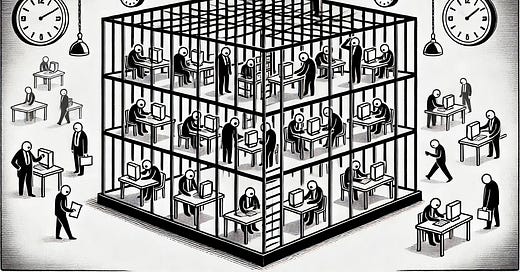Max Weber, the renowned German sociologist, noticed somewhere in the sixties a crucial flaw in overly controlled organizations: they often miss the mark. In his seminal work "Economy and Society," Weber describes how bureaucratic systems—laden with rules, procedures, and hierarchies—may seem as precise as a Swiss watch but, in reality, stifle the very essence of what makes an organization thrive. And what is the first casualty in such a system?
The human element.
Weber foresaw that when the drive for control becomes overpowering, things go south quickly. Organizations become obsessed with oversight, reporting, and endless evaluations. Everything is tracked, checked off, and documented. Yet, in our desperate attempt to maintain control, we overlook the most critical detail in any organization: the people who work there.
What’s left is a rigid framework that everyone is forced to squeeze into, following the rules whether they make sense or not. Weber coined a term for this phenomenon: “stahlhartes Gehäuse”, which translates to the Iron Cage.
Mentors in the Iron Cage
Stage mentors often find themselves trapped in this bureaucratic machinery. They too feel the pressure of the “Iron Cage” Weber so aptly described.
No time, no space. Rules. Processes. And on and on.
The Iron Cage indeed.
As a mentor, your job is a beautiful one: helping young people grow, sharing knowledge, and preparing them for the real world. But in practice? You’re trudging through a swamp of rules and administrative drudgery that distracts you from what truly matters.
Instead of engaging in creativity and inspiring your interns, you’re mainly focused on ticking the right boxes for management and other third parties.
Freedom to act on your experience and insight? No way. You’re tied to rigid procedures. There’s always a form to fill out, external accreditations to meet, strict evaluation criteria to follow—that’s what it’s all about. And so, you find less and less time for what’s truly important: mentoring and developing your interns.
This leads to a strange situation: officially, you’re the mentor. But in reality, you’re just someone who executes rules. Your autonomy is diminished, and your role is reduced to a cog in a bureaucratic machine aimed at making sure ‘things are going as planned out’. Instead of being able to respond to what your interns really need, you must fit them into the frameworks set by the organization.
The strain of the Iron Cage
Many mentors feel a constant tension between what they want to do—support and inspire interns—and what they are required to do by the rules. This tension leads to frustration, helplessness, and often to a “just let this sh*t burn” mentality. The passion for your profession, the reason you became a mentor in the first place, is slowly eroded by the daily grind of administrative obligations.
Is this "just let it burn" mentality something I’ve made up? Not at all. Research backs this up, such as the findings in this study on Future-Proof Craftsmanship. (it’s in dutch)
Weber’s “Iron Cage” perfectly encapsulates this situation. You’re trapped in a system where efficiency and control reign supreme, while the human side—relationships, learning processes, real fulfillment—fades into the background.
Breaking Free from the Iron Cage
A good mentor strives to break open that Iron Cage—for themselves and their interns. This doesn’t mean disregarding the rules but rather critically assessing what’s truly necessary and what can simply be more humane.
Shift the focus from control to trust, from rules to relationships.
Reclaim your role as a mentor in its full scope.
A strong internship program doesn’t fight against this but proactively hands out the tools—metaphorical iron saws—that mentors need.
As a manager you hand out the saw to break the iron bars. Not hidden in a cake, but in plain sight so everybody knows: We take this stuff seriously.
Mentoring interns is a creative act. Not just an administrative task.
Footnote: I’m already getting responses that “it’s not all black and white.” I know. Many organizations do get it right, giving people the space they need.




